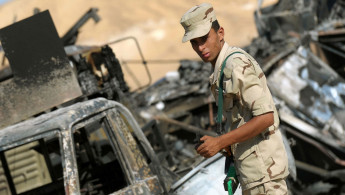Egypt orders suspected Libyan militant detained over attack
Egyptian authorities say a suspected Libyan militant will remain in custody for 15 days pending an investigation into a deadly attack in the country’s Western Desert.
A statement from prosecutors on Friday said the Libyan and 14 other suspected militants face terror-related charges, including killing police forces and joining a militant group.
At least sixteen police were killed in an attack last month, according to an official tally issued by the Interior Ministry.
Security officials have told journalists that dozens more, including high-ranking counterterrorism officers, perished in the attack some 135 kilometers (84 miles) southwest of the capital, Cairo.
Prosecutors said on Thursday a "foreign" militant involved in that attack was captured alive following a retaliatory airstrike and is a Libyan citizen from the city of Derna, considered a hotbed for Islamic militancy.
Armed conflicts since 2014 have left Libya with two rival governments claiming legitimacy. The United Nations-backed Government of National Accord (GNA), based in Tripoli, and its rival, based in the eastern city of Tobruk, and controls large swathes of eastern Libya, with the exception of Derna, and parts of the south.
After the defeat of IS in Derna, the DMSC militant alliance took control of the city. The LNA has launched operations to "liberate" Derna from the DMSC by imposing a seige.
According to international humanitarian law, all attacks must be directed at military targets. Deliberate, indiscriminate, and disproportionate attacks against civilians and civilian structures are prohibited, and warring parties must "take all feasible precautions" to avoid or minimize harm to civilians.
The laws of war require all parties to allow the "rapid and unimpeded passage" of humanitarian aid to civilians at risk, including in areas under siege, and to allow civilians the right to leave.





 Follow the Middle East's top stories in English at The New Arab on Google News
Follow the Middle East's top stories in English at The New Arab on Google News
![Israeli forces ordered bombed Gaza's Jabalia, ordering residents to leave [Getty]](/sites/default/files/styles/image_330x185/public/2176418030.jpeg?h=a5f2f23a&itok=_YGZaP1z)

